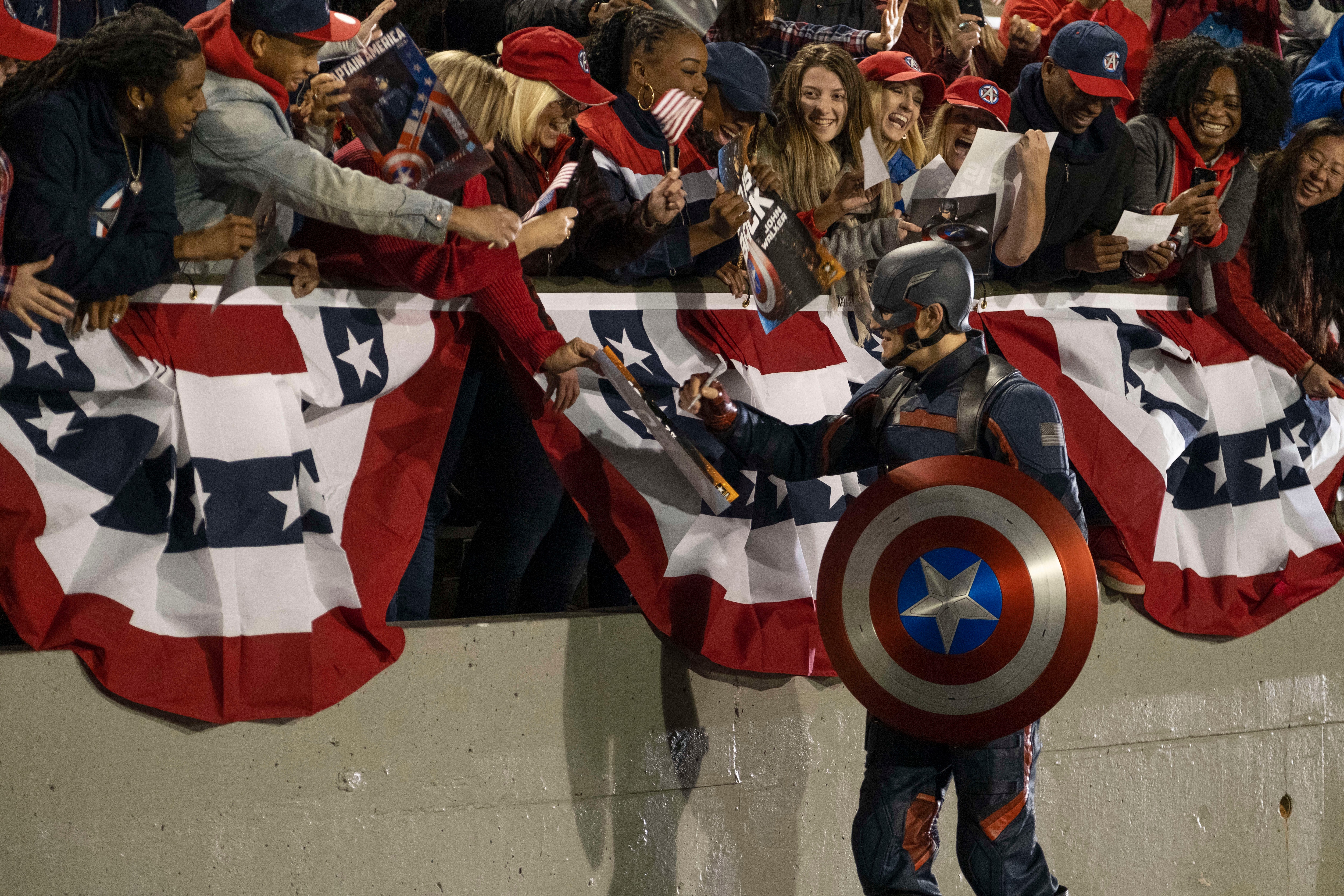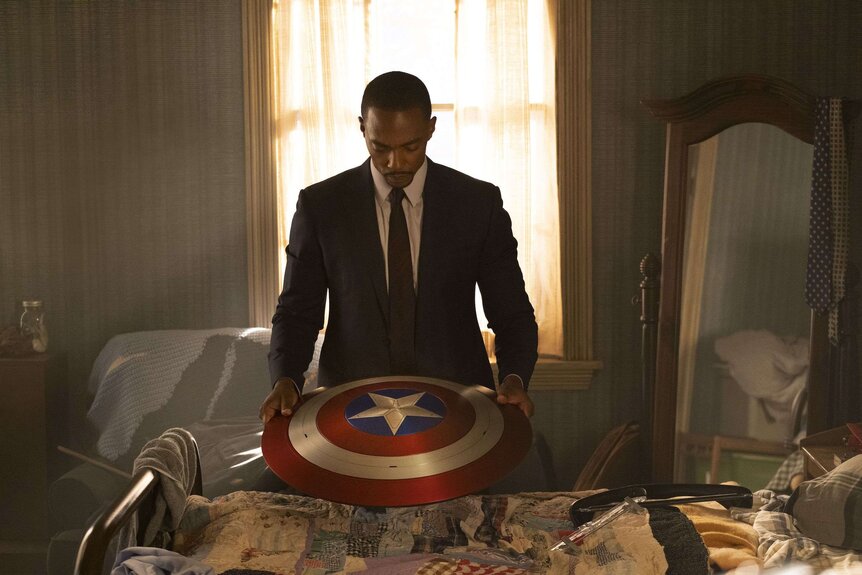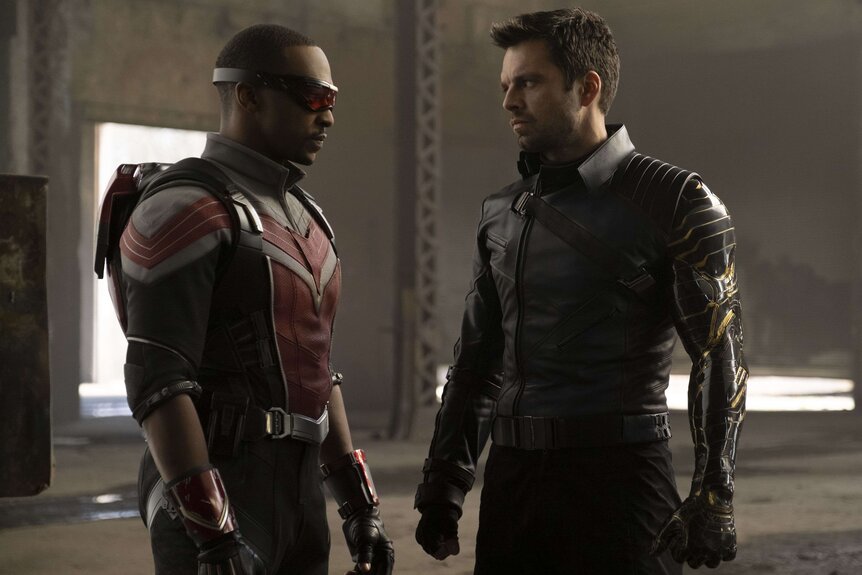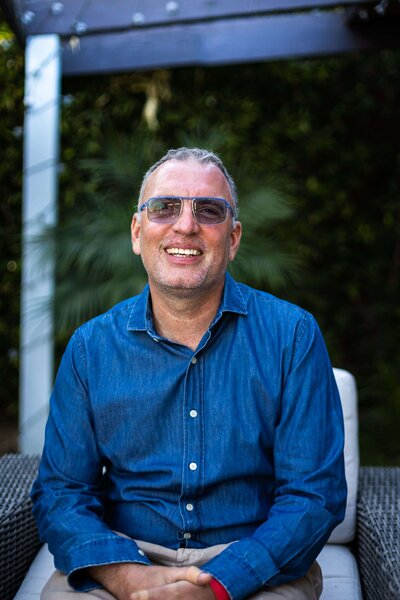Create a free profile to get unlimited access to exclusive videos, sweepstakes, and more!
Composer Henry Jackman on the 'parody' of Fake Cap's theme and giving Bucky Barnes a civilian sound

While The Falcon and the Winter Soldier blazes new trails for returning characters in the Marvel Cinematic Universe, it was still important for the vibe of the series to match the films that came before it. Thankfully, Marvel Studios brought in composer Henry Jackman to score the Disney+ series.
Jackman wrote the music for both Captain America: The Winter Soldier and Captain America: Civil War, giving those movies a different sound from what composer Alan Silvestri brought to Captain America: The First Avenger. Hardly confined to the MCU alone, Jackman's credits also include (but are not limited to) the scores for Kingsman: The Secret Service, Kingsman: The Golden Circle, Cherry, Kong: Skull Island, Jumanji: Welcome to the Jungle, X-Men: First Class, and the video game Uncharted 4: A Thief's End.
SYFY WIRE recently talked with Jackman about how he approached The Falcon and the Winter Soldier, how he expanded themes that already existed, and more.
You've been responsible for the sound of these characters and the general vibe of this part of the MCU since Captain America: The Winter Soldier. How did you first evolve that sound from what we heard in Captain America: The First Avenger?
Yeah, that's a very good question because there's a particular contrast. The First Avenger, which I love, it comes from that part of Captain America's history in the graphic novel that's politically unambiguous. It's a period piece. The Nazis are the bad guys. It's Captain America in his most... I think "simple" would be the wrong word, but he's the center of liberty. Everyone knew where they stood. And so Alan's theme perfectly and brilliantly sets that up. It's got all the almost unquestioning patriotism, it's a great tune — I'm a great fan of Alan.
When you jump to The Winter Soldier, it's a completely different movie. The whole thing is more espionage, thriller, political uncertainties, a way more contemporary film. There was literally only one part of The Winter Soldier, right at the beginning, where the Alan theme worked in this new context to set it up. Thereafter it just required a completely different tone… if you pile on the combination of Captain America, fish out of water, set in the 21st century... [Directors] Joe and Anthony [Russo]'s directorial voice weirdly has something that it takes from some of those gritty '70s political films in a way. And then there's all this crazy, balletic, ninja-style action — everything.
I love writing orchestrally based symphonic, rousing music. A movie like Jumanji exclusively needs constant symphonic language, whereas The Winter Soldier needed this element of toughness. So it was a combination of the theme... a lot of the orchestral thematics were still in there, but a little more contemporary and with this undercurrent of production material and tougher sounds that speak of a world post-2012.
And those were the elements that came together. And to me, I try to think of Bucky... I tried to think of Winter Soldier as the last fragments of a human soul trapped inside some mechanistic frame that he couldn't escape and tortured on the inside. And to me, that just didn't seem that orchestral… I used to make drum and bass music and all kinds of other stuff. I thought, well, the Russos, they're pretty open-minded. I'm just going to go for a Winter Soldier sound that's pretty radical and they're either going to love it or hate it. So some of that obviously now passes over to the new show.
The transition then went on to Captain America: Civil War, which isn't the same but it has the same feel, and now we're in this place where Steve Rogers is out of the picture, but we're still left with these other two characters that we really got to know from those movies. So how has the score, vibe, and sounds transitioned into the new series?
Some elements are absolutely continuing from before, while other really major and important elements like Steve Rogers are now a ghost. It's not like Steve Rogers doesn't exist in a way. In the first episode, the burden of the legacy of the shield and what it means is all tied in with Steve Rogers.
I mean, one of the things that I found really satisfying, I think I'm allowed to talk about this because it's already in the end credits. There was a little motif in Winter Soldier for Falcon when he would fly by, but I never got that much real estate… now I've been able to take that motif and spin it into its full, developed theme, which appears in Episode 1 and 2. In the end credits, there's a slightly badass kind of Louisiana bluesy, rocky version of it. So there's a good example of there being a pregnant motif that I knew had some sort of superhero potential... that's a really satisfying exercise because I always knew there was something in there, but it just was never appropriate to flesh it out.
But it's an interesting point you raised because… we've seen Bucky, Winter Soldier's journey from that through Civil War. By the time you get to Wakanda in the later Avengers movies, he's become the White Wolf. You're seeing this journey as he's getting de-programed. By the time you get to our show, we're seeing the civilian Bucky for the first time since we saw the civilian Bucky in the 1940s. So he's struggling with being 106 years old. And of course, it's only when you get the flashbacks to his life as an assassin you get all the discordant, Winter Soldier tones.
And now there's an evolution where there's now a sort of Bucky civilian thematic, which actually, for musicologists out there, if they want to get really geeky, there's a little thematic shape at the end of that; it's actually in a very peculiar, disturbing octatonic scale that appears right at the end of the track "Winter Soldier" on the original album. And it's like taking a thematic shape from there, ironing out all the weird scale that it used to be in, putting it in a diatonic scale, and that became a Bucky civilian motif for this show.
It sounds like there's just a lot more room for you to breathe and explore because this story has a longer form. You have many hours instead of just two.
That's very perceptive because it's a game changer actually, because if you think about this streaming TV show format… imagine some giant version of, I don't know, like Gandhi where somehow you're expected to sit there. It's not a film arc that's so epic it's six hours — it's episodic. It's an interesting structure. It still has all the ambition of a movie. So you get this epic ambition just like a movie.
But you're right, the fact that you've now got six, one-hour installations means you can still deliver those massive peaks and troughs and the action moments and all the sorts of extremes that you would expect in a Marvel superhero movie. But now you've got all this extra room, you've got much more time for quieter explorative character and drama scenes… and I'm thinking back to Civil War, you would get a scene let's say between Vision and Wanda, but you've got to fit the whole of Civil War to two and half hours. So you'll get three or four meaty character dialogue scenes that have to just sort of crack on a bit. They have to take place in two and a half minutes, otherwise an Avengers movie would be four hours long, and suddenly it's those scenes that now can open out.
Now you've got the equivalent of six hours and not two and a half. You can explore Bucky's backstory, Sam's backstory. What's going on in Louisiana, some of the financial hardships they're up to. You can just tease things a little bit more, and because of the nature of building an exciting structure at the end of each episode, I think people have the patience for it. And that has an effect on the music. It's a very good question because it means that not all the music has to remain in its scale of vocabulary at gear-five all the time. It affects the instrumentation and the patience, the patience of some of the cues. What's great about this is you'll have these more emotional scenes that require a gentle touch and a more static aesthetic where you're not being too narratively on the nose. But then in the very same show, you'll have a huge Flag Smasher piece of music where you're getting fanatics preparing major acts of violence and you'll get giant action sequences. So you actually do get, musically, the full spectrum.
I won't give anything away, but by the time you reach the apex, the climax of the show, the demands for music are the same as the movies. It's just that as you pointed out, there's this other space opened up for more patient character study.
You mentioned using that snippet of the Alan Silvestri score at the very beginning of The Winter Soldier. When you bring back a theme that somebody else started, or say in the second episode, the bastardization of the "Star-Spangled Man" song, are those decisions that you make yourself, or is it more collaborative?
It's very collaborative. For example, because there's so little of it, on Winter Soldier, it's literally the very first cue when we first see Sam and Cap together... You just get that handover from where we left off, and just nothing else in that thematic work thereafter. And in the case of the "Star-Spangled Man," I think, yeah, same thing. Between director, music supervisor, it landed in there and it just becomes a parody. It's perfect.
This is not a Falcon and Winter Soldier question and I know it was a plot point, but in Kingsman: The Golden Circle you have this glorious moment where Country Roads becomes a big part of the score. Was that you?
Yes. Including the Kingsman motif in that… you better show some courage with a filmmaking moment like that, because if you don't go in committed, a scene like that is just going to fall flat on its face. You've got to go in so hard. And what I love about Matthew [Vaughan] is, look... he only has one mode, which is you just go for it full metal. So rather than sort of leave [Mark Strong as Merlin] singing, autotune it a bit and just sort of leave him hanging, it was like, no, no, no, no, no. He starts singing, that's fine. And then we'll leak in the score, and we're not going to pull any punches. There's going to be bagpipes, a full choir. It's going to crescendo to a massive orchestration. While we're at it let's sling in the Kingsman motif. Matthew just kept going, "Just throw."
By the time he gets to that last chord and goes up the octave and then, as we all know, the thing goes off, it's like there's no point holding back, throw everything you've got at it like it's a big number. You need to suspend a little more than you'd normally suspended in films, but it's a moment.
You probably can't answer this, but can fans of yours look forward to more of your music in the MCU?
I can neither confirm nor deny anything as regards to that question.
We had to ask.
All I would say is I love it every time I do it. So there'll be no element on my side to go, "Oh, well, I think I've done quite a lot of it, I'm not too sure I want to do anymore." Every time I get involved in it, I love it. So it's all enthusiasm as far as I'm concerned.
The Falcon and the Winter Soldier flies on Disney+ every Friday.





























